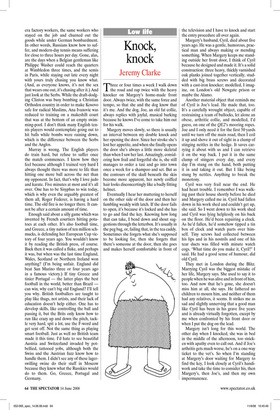Knock, knock
Jeremy Clarke
Three or four times a week I walk down the road and rap twice with the heavy knocker on Margery’s home-made front door. Always twice, with the same force and tempo, so that she and the dog know that it’s me. And the dog, Joe, an old fat collie, always replies with joyful, musical barking because he knows I’ve come to take him out for his walk.
Margery moves slowly, so there is usually an interval between my double knock and her opening the door. Since her stroke she’s lost her appetite, and when she finally opens the door she’s always a little more skeletal than when I saw her last. Amazingly, considering how frail and forgetful she is, she still manages to order a taxi and go into town once a week for a shampoo and set. But as the contours of the skull beneath the skin become more apparent, her newly coiffed hair looks disconcertingly like a badly fitting helmet.
Eventually I hear her muttering to herself on the other side of the door and then her fumbling weakly with latch. If the door fails to open, it’s because it’s locked and she has to go and find the key. Knowing how long that can take, I bend down and shout suggestions through the letterbox. It’s usually in the peg bag, or, failing that, in the tea caddy. Sometimes she forgets what she’s supposed to be looking for, then she forgets that there’s someone at the door, then she goes and makes herself comfortable in front of the television and I have to knock and start the entry procedure all over again.
Margery’s husband, Cyril, died about five years ago. He was a gentle, humorous, practical man and always making or mending something. When Margery keeps me standing outside her front door, I think of Cyril because he designed and made it. It’s a solid construction: three heavy, thickly varnished oak planks joined together vertically, studded with big brass screws and decorated with a cast-iron knocker; modelled, I imagine, on London’s old Newgate prison or maybe the Alamo.
Another material object that reminds me of Cyril is Joe’s lead. He made that, too. It’s a carefully wrought object, capable of restraining a team of bullocks, let alone an obese, arthritic collie, and modelled, I’d guess, on one of the QE2’s mooring ropes. Joe and I only need it for the first 50 yards until we turn off the main road, then I coil it up and shove it out of sight in a clump of stinging nettles in the hedge. It saves carrying it about with us and I can retrieve it on the way back. I put it in the same clump of stingers every day, and every day I’m stung on the hand, both putting it in and taking it out. But I like being stung by nettles. Anything to break the monotony.
Cyril was very frail near the end. He had heart trouble. I remember I was walking past their house shortly before he died and Margery called me in. Cyril had fallen down in his work shed and couldn’t get up, she said. So I went down to his work shed and Cyril was lying helplessly on his back on the floor. He’d been repairing a clock. As he’d fallen, he’d somehow tipped a tin box of clock and watch parts over himself. Tiny screws had collected between his lips and in his nostrils and one of his tear ducts was filled with minute watch cogs. ‘What time do you make it, Cyril?’ I said. He had a good sense of humour, did old Cyril.
They met in London during the Blitz. Marrying Cyril was the biggest mistake of her life, Margery says. She used to say it to people when he was alive and in front of him, too. And now that he’s gone, she doesn’t miss him at all, she says. He fathered no children to mourn him, and neither of them had any relatives, it seems. It strikes me as sad and slightly unnerving that a good man like Cyril has been in his grave five years and is already virtually forgotten, except by me when confronted by his front door or when I put the dog on the lead.
Margery isn’t long for this world. The other day when I knocked, she was in bed in the middle of the afternoon, too stricken with apathy even to call out. And if Joe’s arthritis gets much worse, he’s on a one-way ticket to the vet’s. So when I’m standing at Margery’s door waiting for Margery to find the key, I look closely at Cyril’s handiwork and take the time to consider his, then Margery’s, then Joe’s, and then my own impermanence.


















































































 Previous page
Previous page